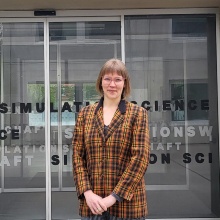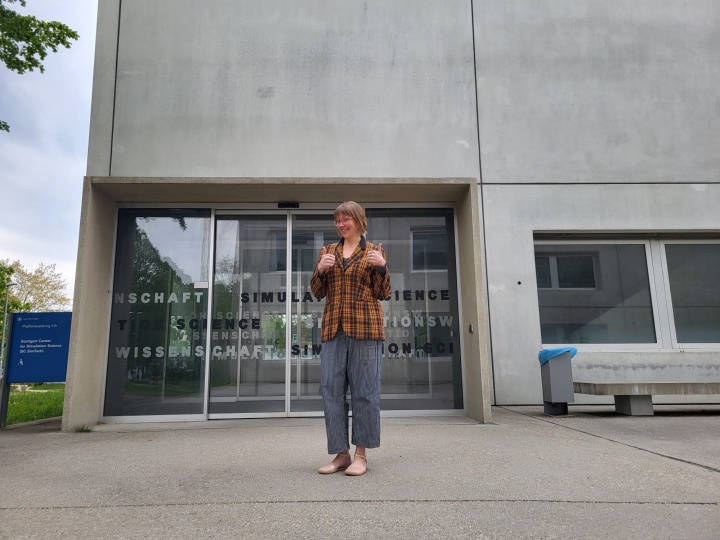SimTech is pleased to announce the arrival of Thanja Lamberts, who will serve as a SimTech Guest Professor from April 22 to May 24, 2024. Lamberts will be joining the research group of Johannes Kästner, where her expertise in computational astrochemistry is expected to bring significant insights to the research conducted within SimTech.
"We are excited to welcome Thanja again. Her knowledge and research background will contribute significantly to our studies. I look forward to the valuable contributions she will make to our research group", says Johannes Kästner to underline his enthusiasm about Lamberts' visit.
Lamberts is an assistant professor at the Leiden Institute of Chemistry and Leiden Observatory. Her research group focuses on computational astrochemistry to understand the formation of molecules in the dense regions of the interstellar medium. She is particularly interested in the chemical reactions that occur on the surface of ice-coated dust grains.
During her PhD with Prof. Dr. H. Linnartz at the Laboratory for Astrophysics, Leiden University, Lamberts worked on experimental surface astrochemistry using ultra-high vacuum and cryogenic technology to mimic the physical conditions in the interstellar medium. This work led her to explore reaction pathways using kinetic Monte Carlo simulations in collaboration with Dr. H. Cuppen at Radboud University Nijmegen.
As an Alexander von Humboldt postdoctoral fellow in the group of Kästner, Lamberts calculated reaction rate constants at low temperatures, well below 100 K. This research is crucial in understanding how chemical reactions occur in cold interstellar conditions, where tunneling plays a significant role in overcoming activation barriers.
Given her prior collaboration with Johannes Kästner's group, the forthcoming visit is expected to further strengthen the existing cooperation and yield new insights into computational astrochemistry. During her time at SimTech, Lamberts will work closely with Kästner's team, which includes a SimTech PhD student, a postdoctoral researcher, two project students, and a master's student. Prof. Kästner is hopeful that Lamberts' visit will strengthen their ongoing collaboration in astrochemical simulations, providing a unique opportunity for his group to learn from an international expert.
In her current work, Lamberts employs computational chemical techniques to study surface processes individually, linking the outcomes to observational, experimental, and modeling work at Leiden Observatory.
With her extensive background and international recognition in astrochemistry, her visit to SimTech is highly anticipated. The focus of the joint research is on the reactions of dust particle surfaces in space with small, simple molecules. The aim is to understand how complex organic molecules can form from these interactions, potentially leading to the first building blocks of life. Kästner noted that Lamberts' expertise in astrochemistry complements his group's knowledge in computational chemistry, making her visit a valuable addition to SimTech.
Important Dates
25 April, 6:00 pm
Beyond the Thesis: Career Conversations between Science and Industry
8 May, 4:00 pm
SimTech Colloquim: Molecular Cocktails on the Rocks: chemistry of ices in stellar nurseries
10 May, 8:00 pm, Planetarium Stuttgart
Eis, Staub und die Bausteine des Lebens in interstellaren Wolken



